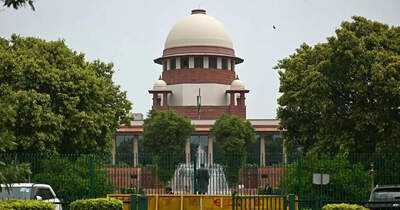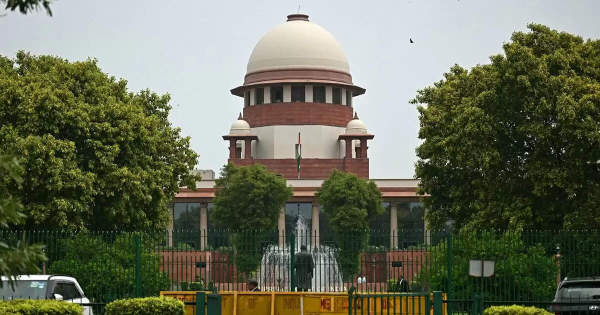
 Supreme Court's Inquiry into Language Bias
Supreme Court's Inquiry into Language Bias
On Friday, the Supreme Court directed the Union government to clarify if authorities are presuming individuals who speak a specific language to be foreigners, as reported by a news outlet.
A panel consisting of Justices Surya Kant, Joymalya Bagchi, and Vipul M Pancholi was reviewing a petition that claims Muslim migrant workers from West Bengal are being detained based on unverified allegations of illegal entry from Bangladesh.
The bench questioned whether citizenship could be determined solely by the language spoken by an individual. Justice Bagchi specifically asked Solicitor General Tushar Mehta, representing the government, to address the potential bias in using language as a basis for presuming someone is a foreigner.
This petition was submitted by the West Bengal Migrant Workers Welfare Board.
This development follows ongoing concerns raised by the Trinamool Congress regarding the detention of Bengali-speaking migrant workers across various regions, suspected of being from Bangladesh.
Since the Pahalgam terror attack on April 22, police in several states governed by the Bharatiya Janata Party have been detaining Bengali-speaking individuals, primarily Muslims, demanding proof of their Indian citizenship.
Some individuals have reportedly been sent to Bangladesh after failing to establish their citizenship, while others mistakenly deported have returned upon verification of their Indian identity.
During the hearing, advocate Prashant Bhushan, representing the petitioner, noted that the Calcutta High Court had postponed a related case involving a woman who was expelled under similar suspicions, pending the Supreme Court's decision on the current petition.
The Supreme Court clarified that the two petitions were distinct, allowing the High Court to proceed with its hearing.
Bhushan argued that the woman was deported solely for speaking Bengali, stating, 'They are saying Bengali language is Bangladeshi language, and therefore, those speaking Bengali must be Bangladeshi.'
He further asserted that deportations should involve an agreement with the Bangladeshi government, as such actions could breach international law. 'You can’t push anyone to another country without that country agreeing to accept them,' he emphasized.
The bench acknowledged the complexity of the issues at hand and indicated it would request the High Court to make a determination.
Justice Bagchi pointed out that there is a difference between someone crossing an international border, where security forces have the right to act, and individuals already within Indian territory, where due process must be followed.
Solicitor General Mehta questioned why organizations were approaching the court instead of the individuals affected by these deportations, asserting, 'But India is not the world’s capital for illegal immigrants.' He mentioned that a system is in place to address such matters.
However, Justice Kant highlighted that the current petition raises serious allegations regarding the detention of Bengali speakers based on their language.
Mehta also claimed that certain organizations and governments benefit from illegal immigration, stating that the Union government aims to prevent these immigrants from depleting resources meant for Indian citizens.
The Solicitor General requested that this case be linked with the ongoing petition concerning the Rohingya community.
The bench has scheduled the next hearing for September 11 and instructed Mehta to submit a response to both the current petition and the Rohingya case.